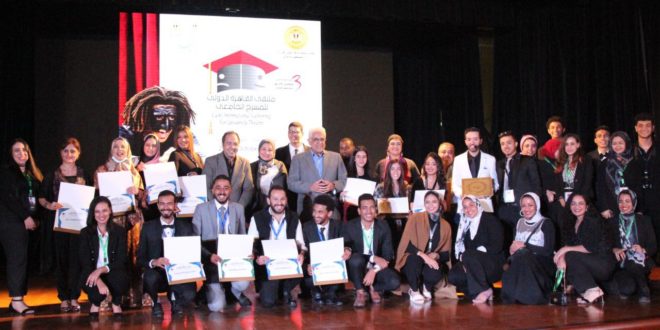The Cairo International Forum for University Theater, in its third session, bearing the name of the late artist Samir Ghanem, during the closing ceremony held at the British University in El-Shorouk, honored Prof.
The forum was headed by director Amr Kabil, founder of the forum, and 12 theatrical performances participated in the forum in its third session, 10 of which were in the official competition of the forum, from the countries of Egypt, Tunisia, Oman, Morocco and Russia.
The forum’s competitions this year also include the Mahmoud Naseem competition for theatrical writing, the Hazem Azmy competition for theater criticism, in addition to a set of seminars within the intellectual framework of the forum.
At the closing ceremony, the festival honored a group of artists and stars, headed by the late artist Samir Ghanem, the star Jamal Suleiman, members of the jury and the winning teams in the competitions, in the presence of the Minister of Youth and Sports, Dr. Ashraf Sobhi.
The jury of the theatrical performance competition consisted of star Jamal Suleiman from Syria, artist Wafaa Al-Hakim from Egypt, Sami Al-Zahrani from Saudi Arabia, Shadia Zaitoun from Lebanon, and Philippe Gigit from France.
Dr. Badrawi gave a speech in which he expressed his admiration for the forum and its role in supporting young artists from all over the world, especially in Egypt.
Stressing the importance of art in building a normal personality and sound conscience during all stages of the educational process
The forum was headed by director Amr Kabil, founder of the forum, and 12 theatrical performances participated in the forum in its third session, 10 of which were in the official competition of the forum, from the countries of Egypt, Tunisia, Oman, Morocco and Russia.
The forum’s competitions this year also include the Mahmoud Naseem competition for theatrical writing, the Hazem Azmy competition for theater criticism, in addition to a set of seminars within the intellectual framework of the forum.
At the closing ceremony, the festival honored a group of artists and stars, headed by the late artist Samir Ghanem, the star Jamal Suleiman, members of the jury and the winning teams in the competitions, in the presence of the Minister of Youth and Sports, Dr. Ashraf Sobhi.
The jury of the theatrical performance competition consisted of star Jamal Suleiman from Syria, artist Wafaa Al-Hakim from Egypt, Sami Al-Zahrani from Saudi Arabia, Shadia Zaitoun from Lebanon, and Philippe Gigit from France.
Dr. Badrawi gave a speech in which he expressed his admiration for the forum and its role in supporting young artists from all over the world, especially in Egypt.
Stressing the importance of art in building a normal personality and sound conscience during all stages of the educational process
 Dr. Hossam Badrawi Official Website
Dr. Hossam Badrawi Official Website


